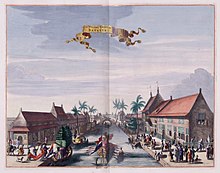Cornelis van Senen
Cornelis van Senen (* in Selamon , Lonthor , Banda Islands , † late 1661 in Batavia ) was an Indonesian teacher , Calvinist preacher and landowner. He became known under the name of Meester Cornelis .
origin
Cornelis van Senen was born into a distinguished family on the island of Lonthor. The Bandanese had already been converted to Christianity by the Portuguese and spoke a ( Creole ) Portuguese . Master Cornelis came to Batavia in 1621 after JP Coen's radical conquest , which almost depopulated the Banda Islands . Many Bandanese had been murdered or fled. Those who remained were enslaved or captured.
The slaves that were brought along - of bandanese or other origin, but also not native Muslims - were often released after a few years. They were called Mardijkers , from the Sanskrit word maharddhika , "very rich, happy and powerful". In ancient Java it was based on the fact that the person was a free man who no longer lived in slavery or serfdom. In Indonesian the word merdeka lives on, which means "free". The Mardijkers eventually settled in their own quarters for “domestic Christians”. The "Kampung Banda", which still exists today, was built in Batavia. Meester Cornelis was probably also a Mardijker.
Schoolmaster and preacher
The lessons were originally in Dutch , which is why it was not accessible to many. In 1635 there were three schools: a school connected to the poor house opened in 1629, a school in the Malabar quarter and a school in the Bandanese quarter. The latter was under the direction of Meester Cornelis from 1635, who taught the basics of the Christian faith in Maleis and later also in Portuguese. He prayed twice a day with the local Christians and on Sundays led the Malei service as a cantor and sermon reader . In the Bandalesian quarter he was mayor.
In 1642 he became a proponent . This meant that he was no longer limited to reading sermons, but could give his own sermons. This consolidated Meester Cornelis' importance as the most important intermediary between the Dutch Council of Churches and the "domestic Christians". Most of the preachers spoke neither Portuguese nor Malay. Meester Cornelis' duties included not only leading church services and religious instruction but also visiting the sick. He oversaw the distribution of diaconal funds, the registration of baptisms and weddings. He tested the beliefs of the candidates for baptism. He advised on the distribution of the Bibles in Malay, supervised the teachers and partly trained them himself.
The office of proponent was formally an ascent to the office of preacher , which also gave him the right to administer baptism and the Lord's Supper . Despite the efforts of the Council of Churches of Batavia, the Governor General and himself in 1647 and 1650, it was a long time before he was finally examined. In 1657 he was finally examined by the Council of Churches of Batavia at the request of the Governor General Joan Maetsuycker and the Heren XVII (management of the Dutch East India Company ) . Previously, he was not admitted because his sermons did not meet expectations.
Landowner
Van Senen did not forget his worldly concerns. He was the owner of a house on the Tijgersgracht. In 1656 he became the owner of a property of about five square kilometers on the Ciliwung River, 12 kilometers southeast of the Batavia fort . There he cleared the forest on property owned by the Dutch East India Company . He only became the owner of the parcel five years later.
Together with his son Zacharias he had the land cultivated and ditches dug as far as Pulo Gadung (East Jakarta). From 1655 Cornelis had his land planted with rice and fruit trees by the Malay man Encik Tjasing from Deli and Abdul from Makassar and his people. Meester Cornelis leased the land and then lived on the rent.
Meester Cornelis died in 1661, but his name remained associated with the area that was called Meester Cornelis until the end of the colonial era . In 1935 the area was incorporated into Batavia .
After the sovereignty treaty with Indonesia of December 27, 1949, Batavia was renamed Jakarta . Other European names were also changed to Indonesian names , reflecting the native language and culture . The area of Meester Cornelis, now a district and residential area of Jakarta, is now called Jatinegara (land of teak wood ). The market in Jakarta, which bears the name Pasar Senen , is not named after Cornelis van Senen. Pasar Senen means Monday market.
literature
- Haan, F. de, Oud Batavia , Batavia, 1922, Bataviaasch Genootschap van Kunsten en Wetenschappen.
- Niemeijer, Hendrik E., Batavia: een koloniale samenleving in de 17e eeuw , Amsterdam, 2005, Uitgeverij Balans, ISBN 90-5018-723-4
| personal data | |
|---|---|
| SURNAME | Senen, Cornelis van |
| ALTERNATIVE NAMES | Cornelis, Meester |
| BRIEF DESCRIPTION | Indonesian teacher, Calvinist preacher and landowner |
| DATE OF BIRTH | 16th century or 17th century |
| PLACE OF BIRTH | Selamon , Lonthor , Banda Islands |
| DATE OF DEATH | 1661 |
| Place of death | Batavia |
